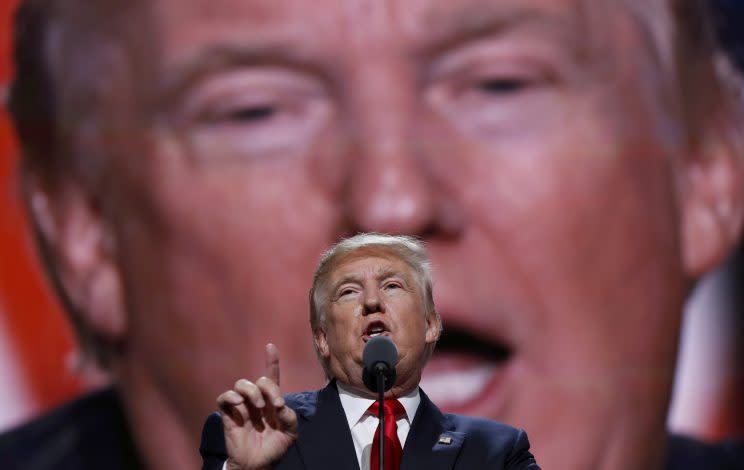Here's what Republicans (and maybe Trump) think about tech policy

Republican Presidential Candidate Donald Trump, speaks during the final day of the Republican National Convention in Cleveland, on July 21, 2016. (Photo: Carolyn Kaster/AP)
Let me be clear: Donald Trump doesn’t think much of Hillary Clinton’s IT strategy.
The Republican presidential nominee’s dystopian speech at the GOP convention denounced Hillary Clinton’s use of a private e-mail system in her last job: “a Secretary of State illegally stores her emails on a private server, deletes 33,000 of them so the authorities can’t see her crime, puts our country at risk, lies about it in every different form.”
But otherwise, Trump’s 77-minute speech barely mentioned technology — that word itself appears nowhere in the text as transcribed by the Washington Post. The only other mention of tech policy came in a paragraph about China that noted its “outrageous theft of intellectual property.”
So we’re left with the Republican Party’s 2016 platform to figure out what the party Trump thinks about this somewhat important sector of the economy. That 66-page document has a great deal to say on the matter, and in a couple of cases it’s not far from the public stances of Clinton.
Broadband access
The GOP platform places a large bet on wireless broadband, pledging to “facilitate access to spectrum by paving the way for high-speed, next-generation broadband deployment and competition on the internet and for internet services.”
The document also allows for government support for broadband expansion: “We encourage public-private partnerships to provide predictable support for connecting rural areas.”
Clinton’s tech platform says about the same. That platform supports “the evolution to 5G, small cell solutions, and other next-generation systems that can deliver faster wireless connections.” It’s also in favor of targeted public funding to “favorably change the economics of private capital investment in existing or new broadband networks.”
Internet freedom
Daylight re-emerges between the parties on the subject of net-neutrality regulations, which the GOP platform denounces as “rules devised in the 1930s for the telephone monopoly.” It also slams the Obama administration’s move to hand off administrative oversight of the internet’s domain-name system to a US-based non-profit called the Internet Corporation for Assigned Names and Numbers.
The GOP platform complains: “He threw the internet to the wolves, and they — Russia, China, Iran, and others — are ready to devour it.”
That is a profoundly dubious argument, given this oversight is extremely limited anyway. Moreover, back in 2012, the Obama administration helped defeat an attempt to give this role to the U.N.’s International Telecommunications Union amid fears that the change would lead to repressive governments having too much power over the internet.
The Republican platform pledges support for “an open and free internet based on principles of free expression and universal values” here and abroad — although pornography is apparently out, since the document calls it “a public health crisis.” The GOP platform also favors “policies to empower citizens and US companies operating in authoritarian countries to circumvent internet firewalls and gain accurate news and information online.”
Another way to phrase that: “We are also supporting the development of new tools that enable citizens to exercise their rights of free expression by circumventing politically motivated censorship,” as then-Secretary of State Clinton said in a January 2010 speech on internet freedom. (My thanks to TechFreedom’s Berin Szóka for pointing that out in his critique of the GOP’s platform.)
Encryption and privacy
Republican presidential candidates were all over the map on whether strong encryption should be controlled, and the platform takes a yes-but stance. It calls crypto “crucial to the digital economy,” warns that criminals and terrorists “seek to use encryption technology to harm us” and declares that “citizens must retain the right to communicate with one another free from unlawful government intrusion.” It concludes that Congress has to settle this — and, yes, a new law could mandate unlocking the strong encryption in an iPhone or Facebook’s optional end-to-end encrypted messaging.
Clinton backs a commission to study this, which is even vaguer.
Cybersecurity
The Republican platform backs not just stronger defenses against attacks on private and public networks — so does Clinton — but offense cybersecurity capabilities, as well. That would include, “curtailing visas for guilty parties, freezing their assets and pursuing criminal actions against them,” but also unspecified attacks, “to avoid the cyber-equivalent of Pearl Harbor.”
I liked this line elsewhere in the platform about a type of information security critical to the continued functioning of democracy: “We urge that electronic voting systems have a voter-verified paper audit trail.”
Intellectual property
The platform says we need to “protect intellectual property rights” but offers little details beyond demanding “strong action” against those who infringe it, here or overseas. There’s no mention of patents at all, which is bizarre given that patent trolling — lawsuits and threats of lawsuits vaguely alleging patent infringement sent by companies set up only to stage these shakedowns — threaten large and small companies alike. Republicans in Congress have been among the leading advocates of reforms that would have the added benefit of inconveniencing the key Democratic constituency of trial lawyers.
Will Trump will have something specific to say about this and other tech-policy debates beyond, perhaps, “I alone will fix it”? The past few months — and his speech at the GOP convention — have yet to provide much reason for optimism about that.
Email Rob at [email protected]; follow him on Twitter at @robpegoraro.
